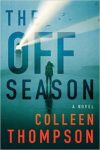

October 3 – 9: “What is your favorite online tool?
 This week we’re joined by ITW Members Benjamin Dancer, Margo Kelly, Colleen Thompson and Rich Zahradnik as they answer the question: “As a thriller writer, what is your favorite online tool?”
This week we’re joined by ITW Members Benjamin Dancer, Margo Kelly, Colleen Thompson and Rich Zahradnik as they answer the question: “As a thriller writer, what is your favorite online tool?”
~~~~~
 Benjamin Dancer is the author of the literary thriller Patriarch Run, the first book in a series that will include Fidelity and The Story of the Boy. He also writes about parenting, education, sustainability and national security. Benjamin works as an Advisor at a Colorado high school where he has made a career out of mentoring young people as they come of age. His work with adolescents has informed his stories, which are typically themed around fatherhood and coming-of-age.
Benjamin Dancer is the author of the literary thriller Patriarch Run, the first book in a series that will include Fidelity and The Story of the Boy. He also writes about parenting, education, sustainability and national security. Benjamin works as an Advisor at a Colorado high school where he has made a career out of mentoring young people as they come of age. His work with adolescents has informed his stories, which are typically themed around fatherhood and coming-of-age.
 Margo Kelly is a native of the Northwest and currently resides in Idaho. A veteran public speaker, Margo is now actively pursuing her love of writing. Her critically acclaimed debut, Who R U Really?, was published by Merit Press (an imprint of F+W Media) in 2014. Her second novel, Unlocked, will be published by Merit Press in October 2016. Margo welcomes opportunities to speak to youth groups, library groups, and book clubs.
Margo Kelly is a native of the Northwest and currently resides in Idaho. A veteran public speaker, Margo is now actively pursuing her love of writing. Her critically acclaimed debut, Who R U Really?, was published by Merit Press (an imprint of F+W Media) in 2014. Her second novel, Unlocked, will be published by Merit Press in October 2016. Margo welcomes opportunities to speak to youth groups, library groups, and book clubs.
 RITA-nominated, bestselling author Colleen Thompson writes stories that explore how love can kill, and how it can also empower us to seek healing and justice. From her fast-paced contemporary romantic thrillers to her sweeping historical romances (written under the pseudonym Gwyneth Atlee) she puts the reader in the heart of the story… when she’s not busy exploring remote corners of her adopted home state of Texas, working with her rescue dogs, or speaking and teaching on the craft of writing.
RITA-nominated, bestselling author Colleen Thompson writes stories that explore how love can kill, and how it can also empower us to seek healing and justice. From her fast-paced contemporary romantic thrillers to her sweeping historical romances (written under the pseudonym Gwyneth Atlee) she puts the reader in the heart of the story… when she’s not busy exploring remote corners of her adopted home state of Texas, working with her rescue dogs, or speaking and teaching on the craft of writing.
 Rich Zahradnik is the award-winning author of the critically acclaimed Coleridge Taylor Mystery series (A Black Sail, Drop Dead Punk, Last Words). The second installment, Drop Dead Punk, won the gold medal for mystery/thriller ebook in the 2016 Independent Publisher Book Awards (IPPYs). It was also named a finalist in the mystery category of the 2016 Next Generation Indie Book Awards. Last Words won the bronze medal for mystery/thriller ebook in the 2015 IPPYs and honorable mention for mystery in the 2015 Foreword Reviews IndieFab Book of the Year Awards.
Rich Zahradnik is the award-winning author of the critically acclaimed Coleridge Taylor Mystery series (A Black Sail, Drop Dead Punk, Last Words). The second installment, Drop Dead Punk, won the gold medal for mystery/thriller ebook in the 2016 Independent Publisher Book Awards (IPPYs). It was also named a finalist in the mystery category of the 2016 Next Generation Indie Book Awards. Last Words won the bronze medal for mystery/thriller ebook in the 2015 IPPYs and honorable mention for mystery in the 2015 Foreword Reviews IndieFab Book of the Year Awards.
- LAST GIRL MISSING with K.L. Murphy - July 25, 2024
- CHILD OF DUST with Yigal Zur - July 25, 2024
- THE RAVENWOOD CONSPIRACY with Michael Siverling - July 19, 2024
